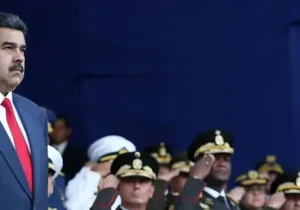“For I was hungry, and you fed me. I was thirsty, and you gave me a drink. I was a stranger, and you invited me into your home.” (Matt. 25:35)
The humanitarian crisis in Venezuela continues, and it is estimated that between three and four million Venezuelans have left the country to seek a better life elsewhere since their homeland continues to face a political and socio-economic crisis. Since the situation will not improve anytime soon, we can expect more Venezuelans to migrate to other Western Hemisphere nations.
This crisis is putting additional stress on regional governments since, in spite of significant economic growth and development in recent years, these nations still have their own challenges, such as poverty, natural disasters, and security problems. Thus, while Latin American governments and societies are behaving like the proverbial Good Samaritan toward their Venezuelan neighbors, more extra-regional support is necessary.
The Region Helps
Due to space issues, we cannot provide an in-depth analysis of the status of the Venezuelan migrants in each Latin American state, but some general examples help provide a good overview of the situation.
Two of Venezuela’s immediate neighbors, Brazil and Colombia, are bearing the brunt of the Venezuelan exodus. Many Venezuelans cross into Colombia en route to Ecuador or other places, but hundreds of thousands stay in the country (particularly in the northeastern states that border Venezuela, like La Guajira, Cesar, Norte de Santander, Santander, and Arauca). In Brazil, there is a sizable population of Venezuelans living on the border, namely in the state of Roraima. The Brazilian military, particularly the air force, is helping the migrants by cooking meals and transporting Venezuelans to different Brazilian cities in an effort to relocate them. For example, the Brazilian daily newspaper O Globo has reported that Venezuelans transported to Manaus state are being kept at three shelters operated by the Catholic Church.
Meanwhile, Argentina, Chile, and Peru have provided temporary work permits to Venezuelans so that they can look for work. According to Peru’s daily newspaper La Republica, there are almost 300,000 Venezuelans in the Andean country, out of which 253,000 currently possess tourist visas and 45,000 have received temporary residency permits. These governments are also validating diplomas (high school, university, and other advanced degrees) so that the newly arrived migrants can apply for better jobs and children can enter schools.
Generally speaking, the Venezuelan migrants appear to be hopeful about their new, and possibly permanent, homes. For example, an article in Peru’s El Comercio quotes a Venezuelan migrant who said that “arriving to Peru is like reaching heaven” after an odyssey of 15 bus rides that took him from the Portuguesa state in Venezuela, through Colombia, Ecuador, and then to the Peruvian capital.
The Limits of Good Samaritanism in Latin America
In spite of these good intentions, it is important to stress that Latin American and Caribbean states are still developing nations, so there are limits to how many Venezuelans they can accept and for how long they can help. For example, the Caribbean islands of Aruba and Curacao, which are part of the Netherlands, have declared that they need help from The Hague to process and provide financial aid to the Venezuelans currently in their islands. Aruba’s prime minister claims that there are as many as five thousand Venezuelans on the island, though sources that this author trusts say that this number is exaggerated.
Unfortunately, these states cannot help everyone, so some Venezuelans have turned to begging in order to survive. Even more, xenophobic, anti-Venezuelan sentiments are slowly spreading. In Colombia, there are already reports of Venezuelans being threatened and harassed, as well as being denied employment or housing due to their nationality. Similarly, in early March xenophobic signs appeared in the streets of Lima, Peru, which read “#PeruSinVenezolanos—Basta ya!” (#PeruwithoutVenezuelans, enough!).
Good Samaritans
The Bible has much to say about the importance of being a Good Samaritan, such as in Matthew 25:35, quoted at the beginning of this essay, or Proverbs 19:17, which says that “one who is gracious to a poor man lends to the Lord, and He will repay him for his good deed.” For a region like Latin America that identifies itself with Catholic beliefs, though the overall percentage appears to be dropping, these teachings resonate on daily life.
So far, Latin American governments have maintained an open-border policy regarding Venezuelans, even if certain local officials and politicians are requesting an end to this policy. Moreover, there are a plethora of news articles about how citizens of Brazil, Chile, Colombia, Ecuador, Peru, and others have opened their homes and wallets to help Venezuelans who attempt to get their lives in order in a new land. This demonstrates that there are many people in the region who understand what being a Good Samaritan really means.
With that said, the international community cannot assume that Latin American governments and societies can handle the Venezuelan exodus alone, particularly if the political and socio-economic crisis in their homeland continues as President Nicolas Maduro remains determined to stay in power—Venezuela has a population of about 30 million, and it is estimated that some 10 percent of the population has left in recent years.
Tragically, Latin America is known for migratory waves that occurred due to violence (like during the Cold War-era internal wars) or political and economic crises, as Venezuela is currently experiencing. For every disaster, there is also the opportunity to do good, and by and large, Latin American governments and societies have demonstrated that, in spite of their domestic problems and limitations, they are willing to give their Venezuelan neighbors a helping hand.
—
Wilder Alejandro Sanchez is a researcher who focuses on geopolitical, military, and cybersecurity issues in the Western Hemisphere. The views expressed in this article are those of the author alone and do not necessarily reflect those of any institutions with which the author is associated.
Photo Credit: Venezuelan refugees board a Brazilian Air Force plane that will take her from Manaus to São Paulo as part of Operation Acolhida. By Romério Cunha for Casa Civil Presidência da República, via Flickr.







 Sponsor a student for Christianity & National Security 2024
Sponsor a student for Christianity & National Security 2024